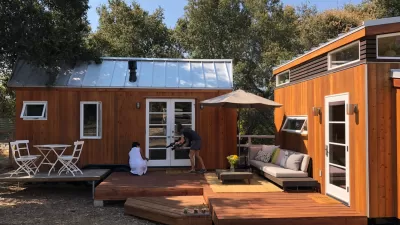Residents in parts of Raleigh would be allowed to build accessory dwelling units (ADUs) on their property, if a majority of their neighbors approve the idea.

"Backyard cottages have cleared a critical hurdle to being approved within Raleigh city limits, but some worry that the proposed rules will be too taxing for most people," reports Anna Johnson.
"The regulations, which were recommended by a Raleigh City Council committee Wednesday afternoon, would require your neighbors to vote on whether you should be allowed to build a backyard cottage," according to Johnson.
The city's new regulations would create a special district where ADUs would be allowed to seek approval from neighbors. The regulations also lay out other zoning and development considerations. The regulations are still several months away from final approval, however.
While there's still time to refine the rules, Philip G. Freelon and Michael Stevenson, architects at Perkins+Will, penned an opinion piece calling a less restrictive approach to ADUs. By severely restricting the ability of homeowners to permit and build ADUs, "[the] zoning policy harkens back to the era when discriminatory planning and zoning was purposefully and effectively used as a means to segregate neighborhoods by race, class and income," according to Freelon and Stevenson.
FULL STORY: After months of scrutiny, backyard cottages take a big step toward approval in Raleigh

Maui's Vacation Rental Debate Turns Ugly
Verbal attacks, misinformation campaigns and fistfights plague a high-stakes debate to convert thousands of vacation rentals into long-term housing.

Planetizen Federal Action Tracker
A weekly monitor of how Trump’s orders and actions are impacting planners and planning in America.

In Urban Planning, AI Prompting Could be the New Design Thinking
Creativity has long been key to great urban design. What if we see AI as our new creative partner?

California Creates Housing-Focused Agency
Previously, the state’s housing and homelessness programs fell under a grabbag department that also regulates the alcohol industry, car mechanics, and horse racing.

Chicago’s Ghost Rails
Just beneath the surface of the modern city lie the remnants of its expansive early 20th-century streetcar system.

Baker Creek Pavilion: Blending Nature and Architecture in Knoxville
Knoxville’s urban wilderness planning initiative unveils the "Baker Creek Pavilion" to increase the city's access to green spaces.
Urban Design for Planners 1: Software Tools
This six-course series explores essential urban design concepts using open source software and equips planners with the tools they need to participate fully in the urban design process.
Planning for Universal Design
Learn the tools for implementing Universal Design in planning regulations.
planning NEXT
Appalachian Highlands Housing Partners
Mpact (founded as Rail~Volution)
City of Camden Redevelopment Agency
City of Astoria
City of Portland
City of Laramie





























